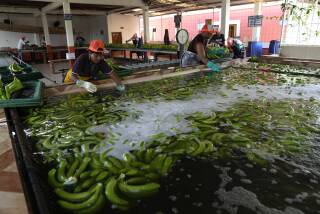Growers of Coca Have a Plan, but It’s Ignored : War on drugs: Peruvian says more profits are needed from other crops to drive out illegal production.
- Share via
CARTAGENA, Colombia — Justo Silva, the manager of a huge farmers’ cooperative in Peru, wanted to tell the drug summit here Thursday how coca production can be stopped. But no one at the summit would listen, he said.
Silva, 45, was invited to the summit by President Alan Garcia of Peru. He was taken to the meeting site with a credential saying he was a member of Peru’s technical delegation.
He had hoped to participate at least in technical meetings, he told reporters. Instead, he complained, he and a companion were ignored.
“All morning I was writing a little bit of what I was going to tell them,” Silva said. “They simply put us in a corner.”
Silva said his cooperative represents 200,000 coca farmers in the Upper Huallaga Valley in the Peruvian Andes. Peru is the biggest producer of coca leaves, the raw material of cocaine, and the Upper Huallaga is where most Peruvian coca is grown.
He said that farmers in his cooperative want to raise legal crops, but because of expensive transportation and low market prices, such produce as coffee, cacao and fruit are unprofitable.
He said that the way to substitute other crops for coca is to establish agro-industries that will turn legitimate crops into more profitable goods.
“Without agro-industry, nothing will work,” he said. “With agro-industry, other crops will be more profitable than coca.”
For example, the farmers would like factories to make paper from sugar cane, oil from palm trees, canned goods from pineapples. With aid from the United Nations, Silva said, a factory already is making chocolate from cacao beans grown in the Upper Huallaga.
“It is profitable,” he said.
American DEA agents, stationed in the valley to fight cocaine trafficking, have given no support for the idea of creating agro-industries, Silva complained.
“They see what the farmers want, but it seems that they never recommend it,” he said. “They are blind men who don’t want to see.”
The joint declaration signed Thursday by Presidents Bush, Garcia, Virgilio Barco Vargas of Colombia and Jaime Paz Zamora of Bolivia calls for crop substitution and for the creation of agro-industries. Silva said he hopes the United States and other countries will provide the aid needed to build agro-industries on a wide scale.
“If this comes true, this summit will be the most historic ever,” Silva said. But he warned that if the aid goes through government hands, bureaucratic corruption and waste may render it ineffective.
“After everyone gets a share, only a drop will be left for the farmers,” he said.
More to Read
Sign up for Essential California
The most important California stories and recommendations in your inbox every morning.
You may occasionally receive promotional content from the Los Angeles Times.













